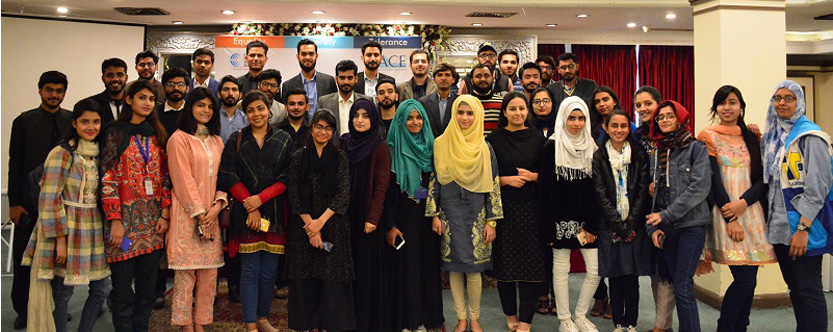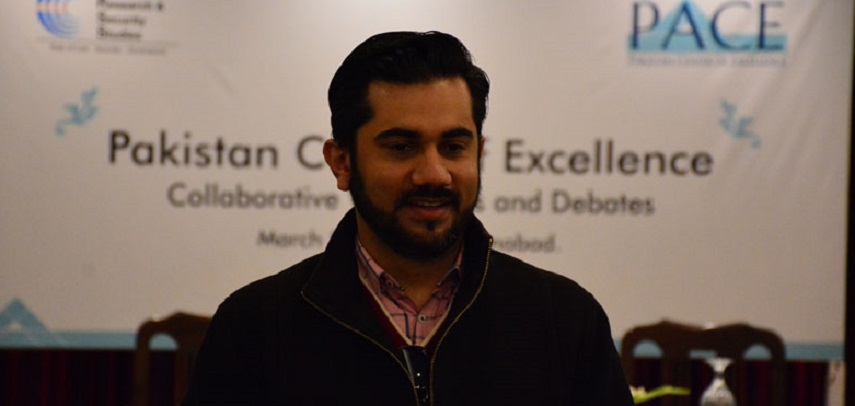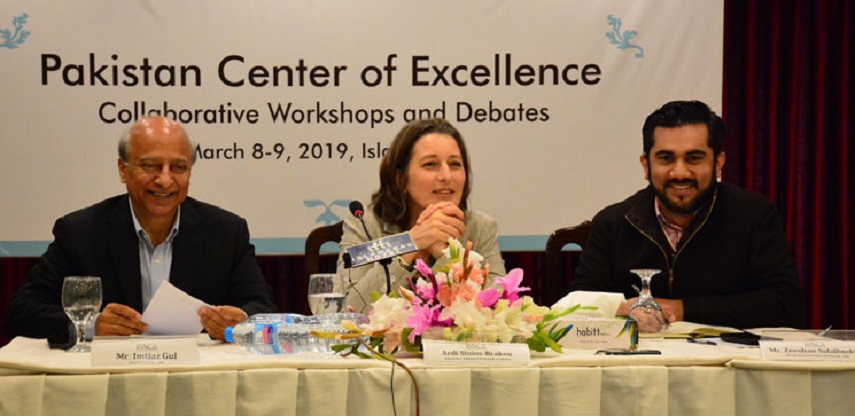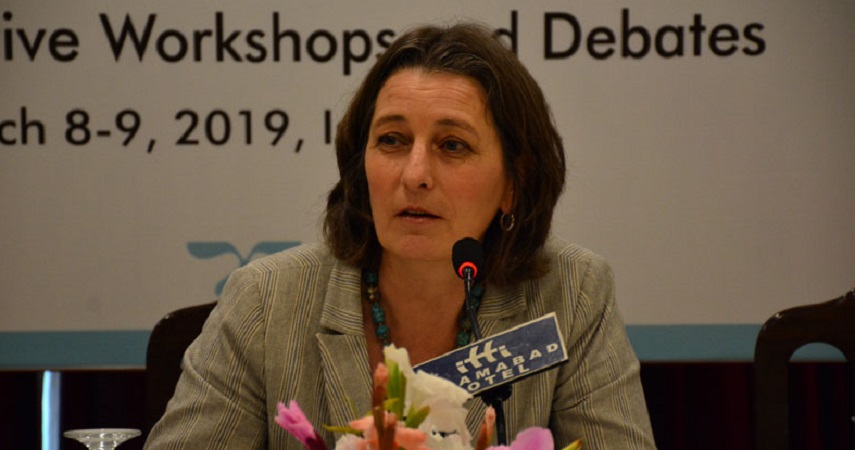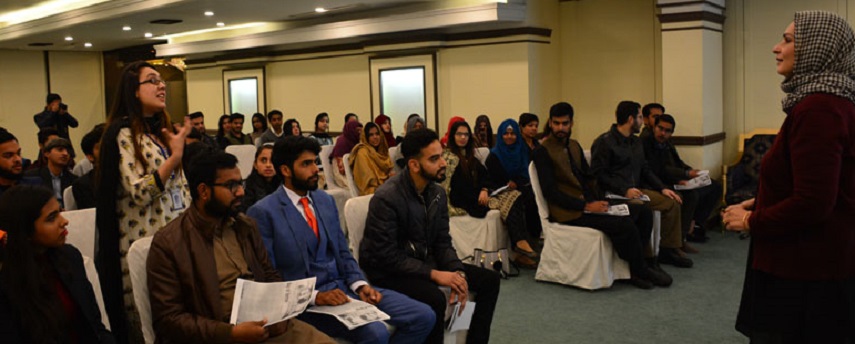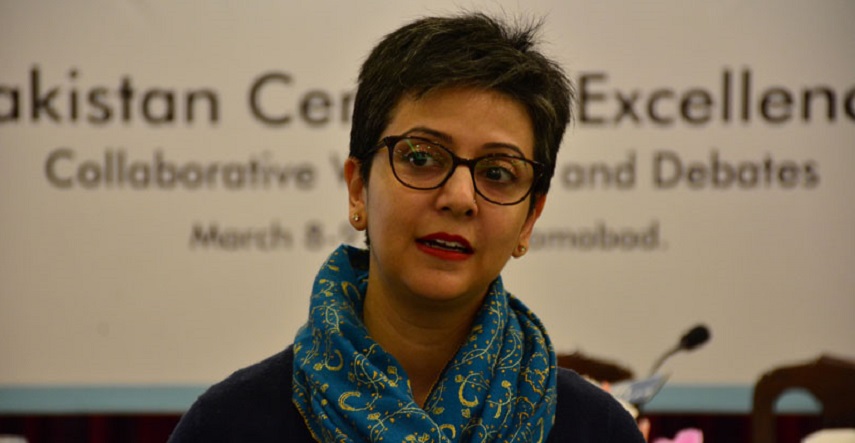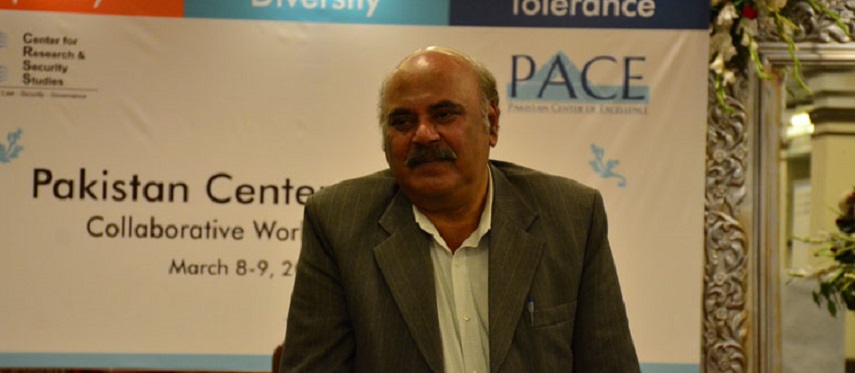The Center for Research and Security Studies (CRSS) conducted the first two-day PACE Collaborative workshops and debates for young university students, on March 8 – 9, 2019. The workshop was held at the Islamabad Hotel, Islamabad. The workshop was conducted under the umbrella of the Pakistan Center of Excellence (PACE), a counter-radicalization, pluralistic values focused project, in collaboration with the Dutch Government.
Participants included young students from Quid-e-Azam University, Federal Urdu University, and Air University, Islamabad. Director Communications and Strategy, Mr. Zeeshan Salahuddin started off the event by welcoming participants to the workshop, saying that PACE is put together by CRSS to counter radicalization, inculcate critical thinking, question preconceived notions and narratives, and embed the national discourse in constitutionalism and the rule of law. He also explained the importance of equal citizenry and its implementation. He emphasised that if Pakistan wishes to represent itself as a rational nation on a global scale it is imperative to adopt the framework of equal citizenship. Furthermore, he added that if the state started viewing its people through a religious prism it would lead to disparities between the people. Mr. Salahuddin also shared the success and achievements of PACE Phase I with the participants.
Mr. Imtiaz Gul, Executive Director, CRSS, explained the objectives of the workshop with the participants saying that equal citizenry is a concept which is guaranteed in the constitutions of all the countries in the world, including Pakistan. Mr. Gul initiated a debate after showing a brief video to the audience while encapsulating some of the ideals that prompted the creation of PACE. He said that these ideals also resonated with the core values that are acknowledged, practiced and respected as fundamental to social harmony, political peace and national cohesion.
Her Excellency, Ambassador of the Netherlands to Pakistan Ardi Stoios-Baraken was chief guest to the opening ceremony. Speaking on the constitution of Netherlands, she shared that it is applauded for supporting freedom of expression which is the basis of multiculturalism. A multicultural society can pose problems too which she explained that immigrants may face discrimination time to time. During a question answer session H.E Ardi Stoios-Baraken thoroughly explained how setting aside religious differences is in the best interest of the state and its citizens. Moreover, she stressed on the importance of women joining a country’s workforce and how the government and the private sector should facilitate working women.
The first formal session of the workshop was started off by Ms. Humaira Masihuddin; an anthropologist and an acclaimed lawyer. She talked on how a society is an intricate system of interlocking groups which function to work together and a distorted relationship between the groups can cause irreparable damage which the government later scrambles to repair . She adeptly explained how understanding and respecting each others core values is the ultimate solution of avoiding conflict. She added that representation of minorities in general elections is the best method of bringing them in the mainstream lines of work.
Ms. Hooriya Hayat Khan conducted her talk on equal citizenry from the perspectives of women empowerment. She held an interactive session with the students enlightening them about the marriage contract and how patriarchal it is, as the entire process requires a male family member. The contract has no female representation and the right of divorce is automatically cancelled out leaving the girl with no choices at all except of khullah. She further discussed about honour killings in Pakistan. She brought to light how the character assassination of the victim immediately weakens the case. A brother who has murdered a sister may be relieved of all charges if a next of kin of the murdered forgives him. She stressed on how these laws call for amendments and that the constitution does not actually protect its people especially women. The session broadened the perspectives of students regarding the process of Nikkah and honour killings.
Mr. Tahir Rathore is an acclaimed journalist and his session was based on media ethics. He gave an insight on reporting and journalism and how crucial it is to report facts and the credibility of the information are the foundations of good journalism. He criticised immature journalism and how it spreads chaos rather than information. He explained how a story should be neutral explaining both sides. According to Mr. Rathore reporting a scandal is a true feat for a journalist. He was open to the thoughts and opinions of students and the session was a success.
Project Manager Mr. Zeeshan Salahuddin had a one on one conversation with the students. Pointing out the importance of a cemented goal he urged them to focus on their aim and stay on a focused path. The outcomes of exclusionary agendas and their chaotic outcomes were discussed. Mr. Salahuddin focused on how crucial it is for women to join hands with men is imperative that the women join the workforce for a progressive society. Furthermore he pointed how a free society is the best form of a society which looks beyond religious boundaries. He ended the session after hearing out what the students had on mind regarding the session.

